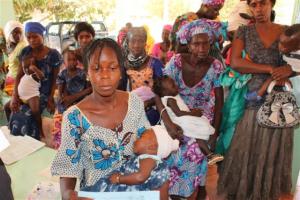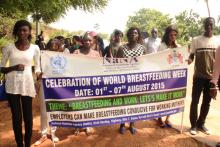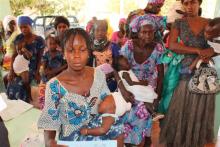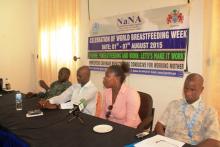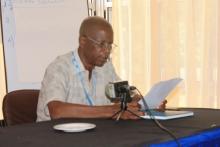Breast feeding,” a positive lifelong Impact on health”
Banjul, The Gambia, 1st September 2015 - WorldBreast Feeding Week was observed in The Gambia, from 1st to 7th August 2015. The Ministry of Health and Social Welfare (MOH&SW), through the National Nutrition Agency (NaNA) and in collaboration with WHO, UNICEF and other partners came up with activities to sensitize the public on the importance of breastfeeding.
The theme, "Breastfeeding and work. Let's make it work", was particularly important not just for breastfeeding mothers, but also for employees to know that they have a big stake in ensuring conducive workplaces for breastfeeding mothers.
Mr. Pa Modou Phall, Executive Director of NaNA representing the Hon. Minister of Health and Social Welfare, thanked WHO, the UN family and other partners for making the day a success to kick start the observance of World Breast Feeding Week to show case how far the country has gone in breast feeding practices and what more need to be done for a greater success.
Mr. Phall reminded the gathering that the reason why the week has been set aside needs to be reflected upon as breast-feeding is accepted universally as the right mode of feeding for all infants. This has been the culture from the time of our great grandparents to our present day. He therefore urged everyone to protect and promote this culture for the future generations.
He highlighted that with vigorous advocacy country-wide through activities and programmes designed by NaNA with support from UN sister agencies and the Association of Health Journalist, a lot has been achieved. The country has now reached 48%, which is 2% less than the WHO 50% global. He stated that the ultimate goal is to ensure that every child is given the opportunity to be breastfed exclusively for six months which will be followed with complementary feeding for 2 years and beyond.
He appealed to the audience to be equipped with the relevant information on breastfeeding as they will be the ambassadors of the country to promote and nurture the culture of breast feeding.
Speaking at the occasion Mr. Alpha Jallow, representing the WHO Representative Dr. Charles Sagoe-Moses, extended best wishes from WHO on this very important event. He noted that breastfeeding is the single most important health intervention and the best source of nutrition for babies.
Mr. Jallow stated that there is no substitute that can replicate breast feeding, which is why WHO recommends breastfeeding exclusively for the first 6 months of life, to begin within one hour of birth. He added that nutritious complementary foods should then be added while continuing to breastfeed for up to two years or beyond
He highlighted that while breastfeeding rates have increased in all regions of the world, global progress has stalled and we are yet to reach the global target set by the World Health Assembly of increasing exclusive breastfeeding rates for children less than six months of age to at least 50 per cent by 2025.
Mr. Jallow appealed for working mothers to be granted adequate maternity benefits, including breastfeeding-supportive workplaces for women working in informal, seasonal or part-time employment as recognized in the ILO conventions.
He reported that breastfed children fall sick less often, so their mothers are also less frequently absent from work with increased job satisfaction and greater loyalty to their employers.
Mr. Jallow finally called on governments to take the lead by making breastfeeding a policy priority in national development plans, increasing resources for programming that supports breastfeeding, and working with communities and families to promote the full benefits of breastfeeding to tackle all the barriers to breastfeeding.
He thanked government and partners for their strive in ensuring good and adequate breast feeding practices noting that our challenge now is to make breastfeeding work in the workplace, too. Together, we can help working women to breastfeed and reap the benefits for themselves, for their children, and for the health and well-being of future generations, he concluded.
The event was also marked with a live coverage of the launching by the Gambia Radio Services as well as panel discussions in other community radios. Regional sensitization is also planned where the regional health team staff will engage communities with breastfeeding messages.
The launching ceremony was preceded by a march past of voluntary organizations, partners and senior health personnel from the New Town junction, through Kairaba avenue to the National Nutrition Agency (NaNA) office where all converged.
_________________________________________________
For more information, please contact:
Mr. Momodou Gassama, Health Promotion Officer, gassamam [at] gm.afro.who.int, (+220) 4462286
Mr. George. Williams, Health Information Assistant, williamsg [at] gm.afro.who.int (+220) 4462284



